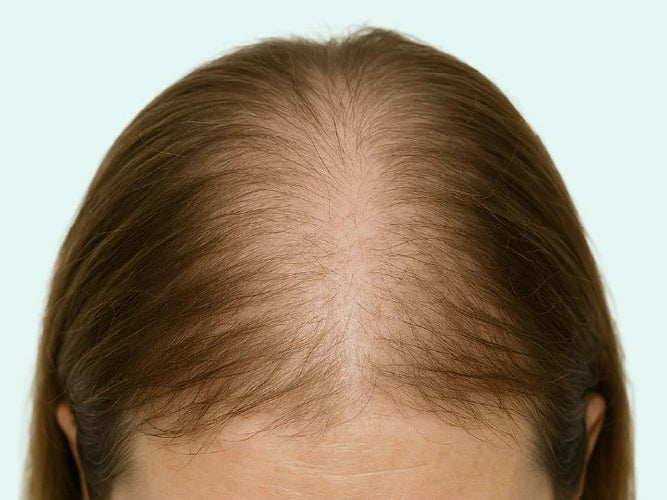Having surgery is stressful enough. But just when you think you're on the mend, you notice your hair is falling out in handfuls. Quite a shock. Fortunately, hair loss after anaesthesia is more common than you might expect, and in most cases, it’s only temporary.
In this blog, we explain what’s going on, how long it typically lasts, and what you can do to give your hair (and yourself) a helping hand during recovery.
What causes hair loss after anaesthesia?
You might think the anaesthetic is to blame, but the reality is a bit more nuanced. In most cases, it's your body responding to the overall stress of surgery. That stress triggers a process known as telogen effluvium, where many hair follicles enter a resting phase, causing sudden hair shedding.
Want to know more? We've written an in-depth blog about telogen effluvium.
Factors contributing to hair loss after anaesthesia
Hair loss after surgery usually isn’t caused by the anaesthetic itself, but rather by a combination of physical stress and other factors. This type of hair loss is often the result of telogen effluvium, a condition in which hair follicles enter a resting phase prematurely.
The main causes include:
-
Physical stress: Surgery places a significant burden on the body, and as a result, hair growth is temporarily deprioritised.
-
Medication use: Painkillers, antibiotics and other post-surgery medications can disrupt the natural hair growth cycle.
-
Nutritional deficiencies: During recovery, your body’s demand for nutrients increases. A lack of protein, iron or B-vitamins may exacerbate hair shedding.
- Pressure on the scalp: Long procedures where the head remains in the same position can lead to localised hair loss, also known as pressure alopecia.
Together, these factors shift your body’s focus to healing and recovery, temporarily pulling resources away from non-essential functions like hair growth.

How long does hair loss after anaesthesia last?
Here’s the strange part: hair loss often doesn’t start until 2 to 5 months after surgery. Just when you think you're finally feeling better: bam, your hair starts falling out.
In most cases, the shedding slows down after 3 to 6 months, and regrowth begins naturally. In less fortunate cases, it might take up to 12 months to return to normal. Very occasionally, in areas affected by prolonged pressure, some small bald spots may remain.
But the good news? For most people, the hair grows back just fine.
How to recognise severe hair loss after anaesthesia
Everyone loses hair, it’s perfectly normal. But if you're suddenly shedding far more than usual, leaving clumps in your hairbrush or the shower drain, something more might be going on.
If your ponytail feels noticeably thinner, or your scalp is becoming more visible, it’s a sign to pay attention. And if bald patches or thinning around the temples develop within a few weeks, your body may be trying to tell you something.
If it doesn’t feel right or you’re unsure, don’t hesitate to speak to your general practitioner or a dermatologist. You’re not alone in this.
What can you do about hair loss after anaesthesia?
You may not be able to stop the process entirely, but there’s plenty you can do to give your body (and your hair) the support it needs. Here are five ways that could make a difference:
-
Nourish yourself from the inside out
A diet rich in protein and variety is essential. Hair is made primarily of keratin, a protein that needs building blocks like iron, zinc and B-vitamins to form properly. Feed your follicles!
-
Rest and reduce stress
Stress is the enemy of healthy hair growth. So, take it easy, get plenty of sleep, and find moments of calm where you can. Your body heals faster when you’re in recovery mode: mentally and physically.
-
Stimulate your scalp
A healthy scalp lays the foundation for strong hair. Massage it daily to boost blood flow or use a stimulating shampoo like the Neofollics Exfoliating Shampoo, paired with the Neofollics Scalp Therapy products.
-
Take targeted supplements
Sometimes your body needs a bit of extra help. The Neofollics Hair Growth Supporting Tablets contain clinically backed ingredients like biotin, folic acid, zinc and saw palmetto to support healthy hair growth.
-
Choose proven hair growth treatments
Active hair care products can support your natural recovery process. Try the Neofollics Hair Growth Stimulating Shampoo and Lotion, which contain Neoxyl®, caffeine and EGCG to activate hair growth and reduce shedding.
Combine these steps for best results. Be patient, consistent, and kind to yourself, most people will see their hair begin to recover within a few months.
When should you see a doctor?
Speak to a doctor or dermatologist if:
- Hair loss continues for more than 12 months
- You develop bald patches that don’t improve
- You experience other symptoms alongside hair loss (e.g. fatigue, itching)
A simple blood test can identify underlying issues like iron deficiency or thyroid problems.
Conclusion
Just when you think you're recovering from anaesthesia, your hair starts falling out, it's an upsetting experience. Thankfully, it’s usually temporary. In most cases, it’s caused by telogen effluvium: the body’s natural response to stress, surgery or medication, in which hair follicles enter a resting phase prematurely.
The good news? Hair almost always grows back on its own, especially when you support your body with proper rest, nutrition, and targeted care. By being mindful of your recovery, being gentle with yourself, and using the right hair products when needed, you can help speed up the process.
Sources
Medical News Today – Anesthesia and Hair Loss
National Library of Medicine (PMC) – Pressure Alopecia
Healthline – Hair Loss After Surgery
This information does not replace professional medical advice. If in doubt, always consult a doctor or specialist.













